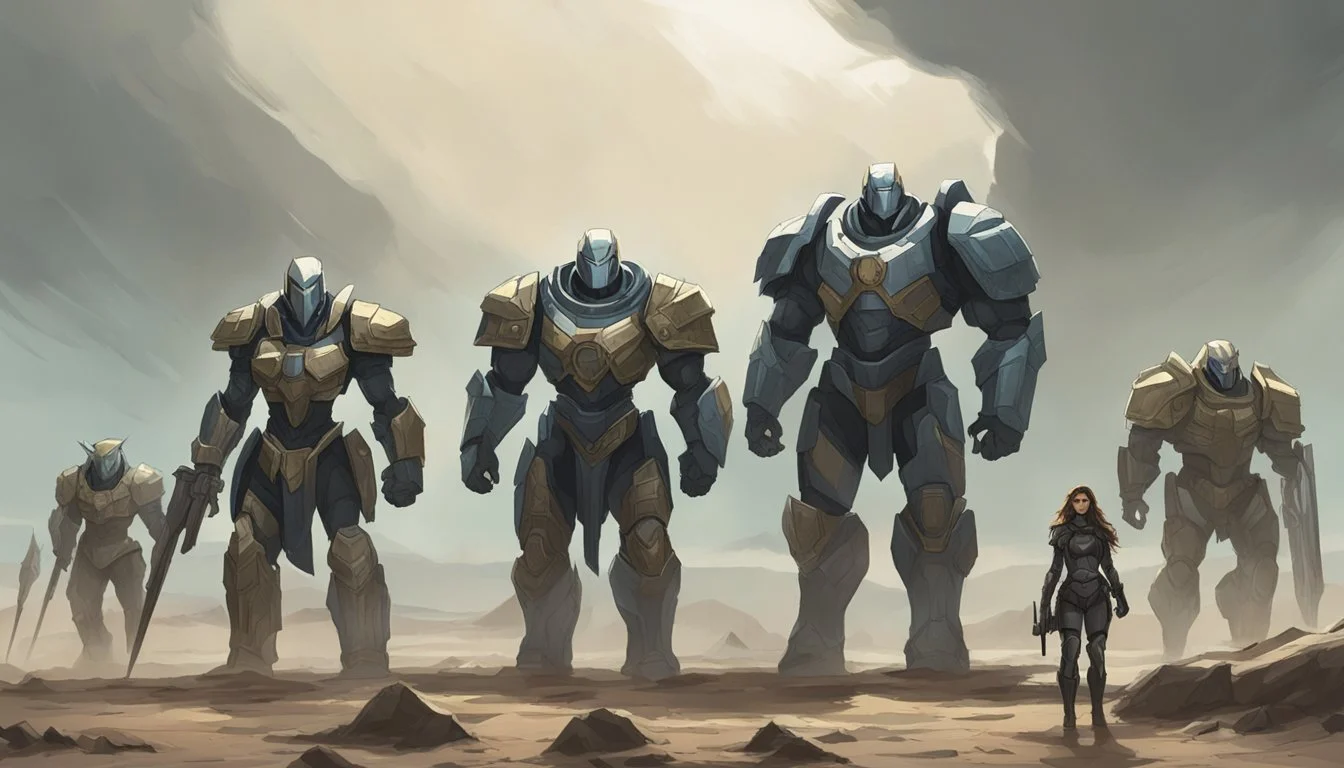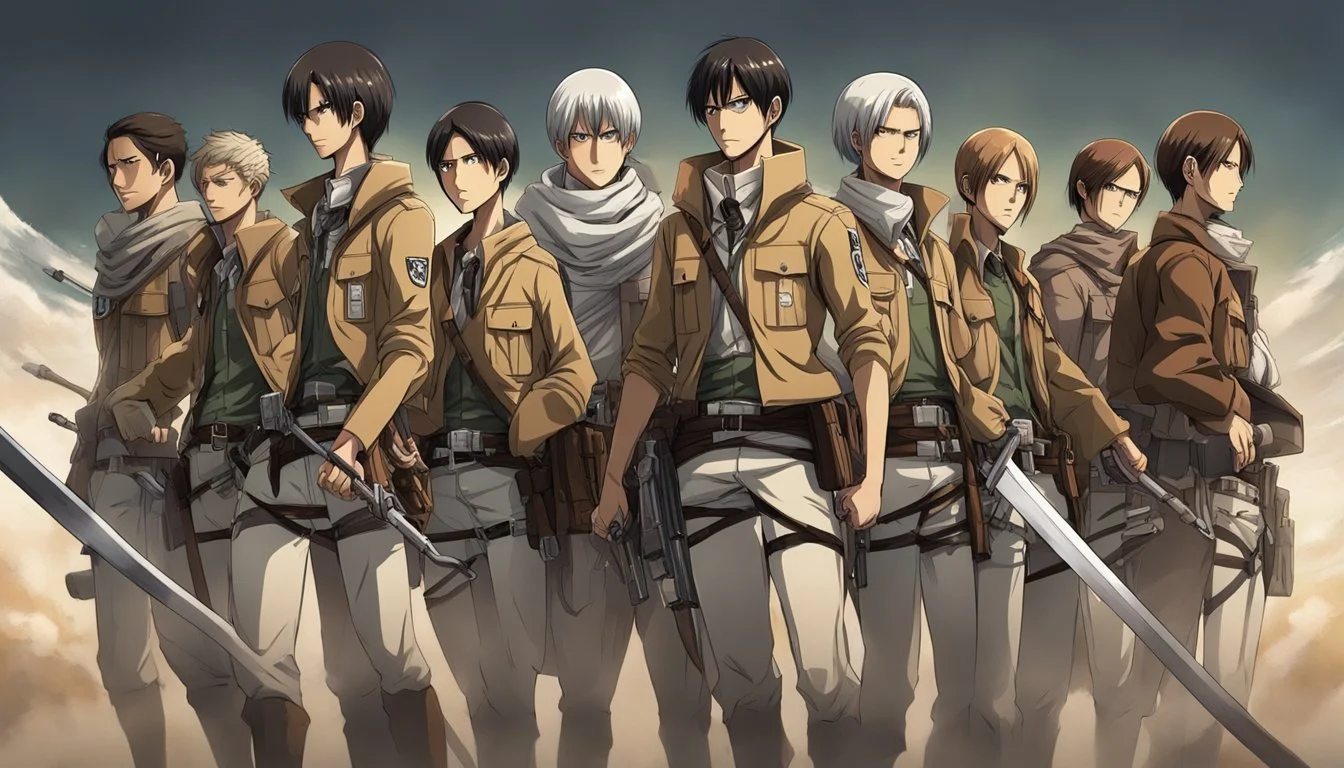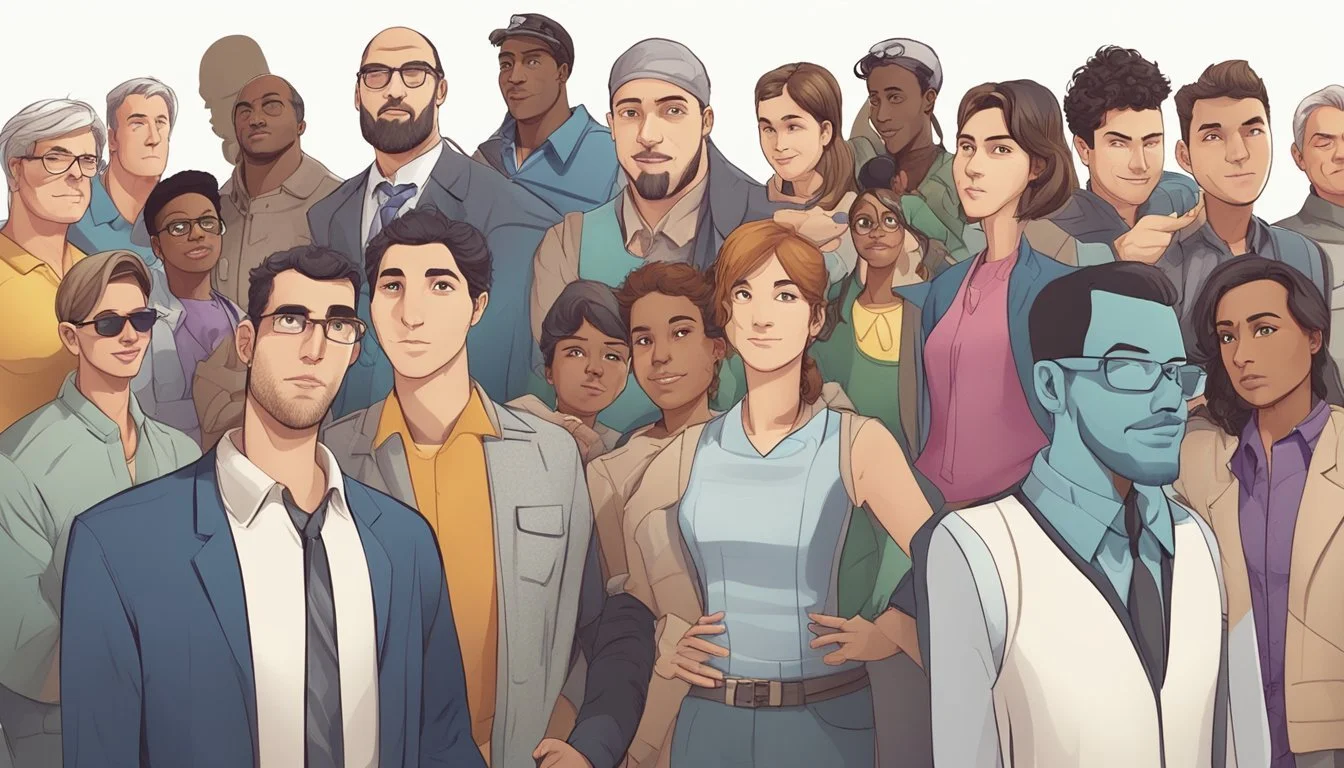Decoding Attack on Titan Personality Types: MBTI Insights into Your Favorites
Attack on Titan captivates audiences with its gripping storyline and complex characters. The popular shonen anime features a diverse cast, each with distinct personalities that drive the narrative forward. Analyzing the Myers-Briggs Type Indicator (MBTI) of Attack on Titan characters provides insight into their motivations, strengths, and weaknesses.
Fans of the series can explore how different personality types interact within the world of Titans and human survivors. From Eren Yeager's determined ENFJ nature to Mikasa Ackerman's loyal ISTJ traits, understanding MBTI types adds depth to character analysis. This psychological framework offers a new lens through which to view the intense relationships and conflicts that unfold throughout the anime.
Examining Attack on Titan through the MBTI perspective can enhance viewers' appreciation for the show's intricate character development. It allows fans to draw connections between personality traits and pivotal plot points, enriching their overall experience of this beloved anime series.
Overview of 'Attack on Titan'
Attack on Titan, known in Japanese as Shingeki no Kyojin, is a popular anime and manga series created by Hajime Isayama. The story takes place in a world where humanity lives within enormous walled cities to protect themselves from giant humanoid creatures called Titans.
The series follows Eren Yeager and his friends as they join the Survey Corps, a military group dedicated to fighting Titans and uncovering the mysteries of their world. Attack on Titan is known for its intense action scenes, complex plot, and morally ambiguous characters.
Key elements of the series include:
The three concentric walls: Maria, Rose, and Sina
Vertical maneuvering equipment used by soldiers
Different types of Titans, including intelligent ones
Political intrigue and conspiracy theories
Attack on Titan has gained worldwide popularity due to its gripping narrative and thought-provoking themes. The anime adaptation has further increased its fanbase, bringing the intense battles and emotional moments to life on screen.
The series explores themes of freedom, sacrifice, and the nature of humanity. It challenges viewers to question their beliefs and consider the consequences of their actions.
Understanding Personality Typing
Personality typing systems like the Myers-Briggs Type Indicator (MBTI) offer a framework for categorizing individuals based on their preferences and behaviors. The MBTI identifies 16 distinct personality types, each represented by a four-letter code.
These codes are derived from four dichotomies:
Extraversion (E) vs. Introversion (I)
Sensing (S) vs. Intuition (N)
Thinking (T) vs. Feeling (F)
Judging (J) vs. Perceiving (P)
Each person's type is determined by their dominant traits in each category. For example, an INFJ is Introverted, Intuitive, Feeling, and Judging.
Personality types can provide insights into how people perceive the world, make decisions, and interact with others. This information can be valuable for self-awareness, team building, and character analysis in fiction.
It's important to note that personality types are not rigid classifications. People may exhibit traits from multiple types, and their preferences can evolve over time.
When applying MBTI to fictional characters like those in Attack on Titan, fans can gain a deeper understanding of character motivations and relationships. This can enhance the viewing experience and foster discussions about character development.
Main Characters and Their MBTI Profiles
Attack on Titan features complex characters with distinct personalities. Understanding their MBTI profiles provides insight into their motivations and behaviors throughout the series.
Eren Yeager
Eren Yeager is often typed as an ISFP (Introverted, Sensing, Feeling, Perceiving). His passionate and impulsive nature aligns with this profile. Eren's strong sense of purpose and desire for freedom drive his actions.
As an ISFP, Eren relies on his intuition and personal values to make decisions. This explains his unwavering determination to eliminate the Titans and protect humanity.
Eren's personality type contributes to his role as a shonen protagonist. His fierce independence and willingness to take risks make him a compelling character for viewers to follow.
Mikasa Ackerman
Mikasa Ackerman typically fits the ISTJ (Introverted, Sensing, Thinking, Judging) profile. Her calm demeanor and dedication to duty reflect these traits.
As an ISTJ, Mikasa excels in practical matters and remains loyal to those she cares about. Her exceptional combat skills stem from her ability to focus and execute tasks efficiently.
Mikasa's personality complements Eren's more impulsive nature. Her steadfast presence provides balance to the main cast's dynamics.
Armin Arlert
Armin Arlert is often categorized as an INFJ (Introverted, Intuitive, Feeling, Judging). His strategic thinking and empathetic nature align with this personality type.
As an INFJ, Armin possesses a unique combination of analytical skills and emotional intelligence. This allows him to devise creative solutions to complex problems.
Armin's personality type makes him an invaluable asset to the Survey Corps. His ability to understand others' motivations and anticipate future events proves crucial in many situations.
Levi Ackerman
Levi Ackerman is frequently typed as an INTJ (Introverted, Intuitive, Thinking, Judging). His strategic mindset and cool demeanor fit this profile well.
As an INTJ, Levi excels in analyzing situations and making logical decisions. His tactical brilliance and leadership skills stem from this personality type.
Levi's no-nonsense attitude and focus on efficiency make him a respected figure within the military. His INTJ traits contribute to his reputation as humanity's strongest soldier.
Historia Reiss
Historia Reiss is often classified as an ENFP (Extraverted, Intuitive, Feeling, Perceiving). Her compassionate nature and adaptability align with this personality type.
As an ENFP, Historia possesses a natural charm and ability to connect with others. This trait becomes particularly important as she assumes her role as queen.
Historia's personality type allows her to inspire hope in others, even in dire circumstances. Her empathy and idealism make her a symbol of positive change within the walls.
Supporting Characters and Their MBTI Profiles
The supporting cast of Attack on Titan showcases diverse personalities that shape the story's dynamics. These characters' MBTI types offer insight into their motivations, strengths, and roles within the narrative.
Jean Kirstein
Jean Kirstein, an ESFP (Extraverted, Sensing, Feeling, Perceiving), brings a vibrant energy to the 104th Training Corps. His outgoing nature and adaptability make him a natural leader in crisis situations.
Jean's quick thinking and practical approach to problems stem from his dominant Se (Extraverted Sensing) function. This allows him to react swiftly to immediate threats and changes in his environment.
Despite initial clashes with Eren, Jean's Fi (Introverted Feeling) drives his strong sense of personal values. This trait evolves throughout the series, leading to more selfless decisions and a deeper commitment to humanity's cause.
Jean's ESFP traits shine in his ability to inspire others through action and his pragmatic leadership style.
Sasha Braus
Sasha Braus, another ESFP, brings levity and spontaneity to the often grim world of Attack on Titan. Her carefree attitude and love for food stem from her dominant Se function, which focuses on immediate sensory experiences.
Sasha's aux Fi manifests in her strong bonds with fellow soldiers and her instinctive desire to protect others. This emotional core drives her growth from a food-obsessed recruit to a skilled and dependable soldier.
Her Ne (Extraverted Intuition) allows for creative problem-solving, as seen in her unconventional battle tactics. Sasha's ESFP traits make her adaptable and quick-thinking in combat situations.
Her character development showcases the depth an ESFP can achieve when faced with life-threatening challenges.
Connie Springer
Connie Springer, also an ESFP, shares many traits with Sasha. His energetic personality and ability to lighten tense situations reflect his dominant Se function.
Connie's aux Fi guides his strong loyalty to friends and comrades. This internal value system becomes crucial as he faces difficult moral choices throughout the series.
His tertiary Te (Extraverted Thinking) emerges in high-pressure situations, allowing him to make quick, logical decisions. This balance of emotional drive and practical thinking makes Connie a reliable team member.
Connie's ESFP personality shines through his adaptability and unwavering support for his fellow soldiers, even in the face of personal loss and tragedy.
Reiner Braun
Reiner Braun, an ESTJ (Extraverted, Sensing, Thinking, Judging), presents a complex character driven by duty and structure. His dominant Te function manifests in his natural leadership abilities and focus on efficiency.
Reiner's aux Si (Introverted Sensing) contributes to his strong sense of tradition and duty, often conflicting with his hidden mission. This internal struggle becomes a central part of his character development.
His tertiary Ne allows for strategic thinking, making him a formidable soldier and tactician. Reiner's inferior Fi explains his difficulty reconciling his actions with his personal values.
The ESTJ traits in Reiner create a character torn between his perceived duty and his growing attachment to his comrades.
Annie Leonhart
Annie Leonhart, an ISTP (Introverted, Sensing, Thinking, Perceiving), stands out with her reserved nature and exceptional combat skills. Her dominant Ti (Introverted Thinking) function drives her analytical approach to situations.
Annie's aux Se allows her to excel in physical combat, reacting swiftly to opponents' movements. This combination makes her a formidable fighter and a key asset in missions.
Her tertiary Ni (Introverted Intuition) contributes to her ability to see beyond surface-level information, often leading to crucial insights. Annie's inferior Fe (Extraverted Feeling) explains her difficulty in forming close bonds with others.
Annie's ISTP personality manifests in her pragmatic approach to survival and her tendency to remain detached from emotional entanglements.
Antagonists and Their Personalities
The antagonists in Attack on Titan display complex personalities that shape their motivations and actions. Their distinct traits drive the conflict and challenge the protagonists in unique ways.
Zeke Yeager
Zeke Yeager, the Beast Titan, exhibits traits of an ENTJ personality type. He's a strategic thinker with exceptional leadership skills. Zeke's confident and charismatic nature allows him to inspire loyalty among his followers.
His analytical mind enables him to devise intricate plans. Zeke often takes a big-picture view, focusing on long-term goals rather than immediate outcomes.
As an ENTJ, Zeke is driven by logic and efficiency. He's not afraid to make tough decisions, even if they involve sacrificing others for what he perceives as the greater good.
His assertive nature and willingness to take charge make him a formidable opponent for the Survey Corps.
Reiner Braun
Reiner Braun, the Armored Titan, aligns with the ESTJ personality type. He's known for his strong sense of duty and loyalty to his mission.
As an ESTJ, Reiner values structure and order. He excels in organizing and leading others, often taking on a protective role within his team.
Reiner's practical nature allows him to adapt to challenging situations. He's skilled at making quick decisions under pressure, a trait that serves him well in combat.
However, his strict adherence to rules and expectations sometimes conflicts with his personal feelings. This internal struggle contributes to the complexity of his character.
Bertholdt Hoover
Bertholdt Hoover, the Colossal Titan, displays characteristics of an INFP personality type. He's introspective and deeply emotional, often struggling with the moral implications of his actions.
As an INFP, Bertholdt is driven by his inner values and ideals. He's sensitive to the feelings of others, which sometimes leads to hesitation in critical moments.
Bertholdt's quiet and reserved nature masks his immense power as the Colossal Titan. He prefers to avoid conflict when possible, but can be surprisingly assertive when pushed.
His tendency to internalize his thoughts and emotions contributes to his complex character development throughout the series.
Pieck Finger
Pieck Finger, the Cart Titan, exhibits traits consistent with the INFJ personality type. She's insightful and analytical, often able to see beyond surface-level information.
As an INFJ, Pieck is highly intuitive and empathetic. She excels at understanding the motivations of others, which makes her a valuable asset to her team.
Pieck's strategic thinking allows her to devise creative solutions to problems. She's adaptable and quick-witted, traits that complement her unique Titan abilities.
Her loyalty to her comrades and dedication to her cause are defining aspects of her character. Pieck's quiet strength and intelligence make her a formidable opponent.
Personality Dynamics in 'Attack on Titan'
The characters in 'Attack on Titan' display diverse personality traits that shape their interactions and decisions. These unique traits influence leadership approaches, team cohesion, and interpersonal relationships within the series.
Leadership Styles
The Survey Corps features contrasting leadership styles. Erwin Smith, an ENTJ, leads with strategic vision and charisma. He makes tough decisions and inspires loyalty through his unwavering dedication to humanity's cause.
Levi Ackerman, an INTJ, takes a more pragmatic approach. His tactical brilliance and blunt demeanor command respect among his subordinates. Levi's leadership focuses on efficiency and results.
Eren Jaeger, initially impulsive, grows into a more complex leader. His ESTP personality drives him to take bold actions, often challenging established norms within the military hierarchy.
Team Dynamics
The diverse personalities within the 104th Training Corps create a unique team dynamic. Armin Arlert, an INFJ, contributes strategic insight and emotional intelligence to group decisions.
Mikasa Ackerman, an ISTP, excels in combat situations and provides unwavering support to her teammates. Her quiet strength complements the more outspoken members of the group.
Jean Kirstein, with his ENFP traits, brings adaptability and quick thinking to team operations. His ability to see multiple perspectives often proves valuable in critical situations.
Friendships and Rivalries
Close bonds form between characters with complementary personalities. The friendship between Eren, Mikasa, and Armin showcases how different traits can create a strong, balanced relationship.
Eren and Jean's rivalry stems from their contrasting approaches to problem-solving. Their ESTP and ENFP personalities clash, leading to frequent disagreements but also pushing each other to improve.
Connie and Sasha, both ESFPs, share a lighthearted bond that provides comic relief and emotional support within the group. Their friendship highlights the importance of maintaining positivity in dire circumstances.
Historia Reiss, an ENFJ, forms unexpected connections across personality types. Her empathetic nature allows her to bridge gaps between different factions within the military and royal court.
Themes of Identity and Growth
Attack on Titan explores deep themes of identity and personal growth through its complex characters. Many individuals struggle to define themselves within the harsh world they inhabit.
Eren Yeager's journey exemplifies this theme. He transforms from an impulsive, vengeful child into a more strategic and morally conflicted young man. His identity shifts dramatically as he uncovers truths about his Titan abilities and heritage.
Armin Arlert experiences significant growth throughout the series. Initially timid and unsure, he develops into a brilliant tactician. His analytical INTP personality allows him to see possibilities others miss.
Levi Ackerman's stoic ISTJ nature masks a complex inner world. Though outwardly unchanged, he grapples with loss and loyalty. His growth is more subtle, seen in his evolving relationships and priorities.
The MBTI framework offers insight into how different personality types approach identity formation and personal development. Some characters lean on logic, while others are guided by emotions or ideals.
As the story progresses, many characters are forced to confront and sometimes revise their core beliefs. This struggle between individual identity and larger societal forces is a central tension of the series.
Psychological Analysis of Characters
Attack on Titan's characters exhibit complex psychological profiles that contribute to their depth and development throughout the series.
Eren Yeager displays traits of an ENFJ personality type. His passionate idealism and ability to inspire others align with this type's characteristics. Eren's strong sense of justice and determination to protect humanity drive his actions.
Mikasa Ackerman fits the ISTJ profile. Her unwavering loyalty, practicality, and strong sense of duty are hallmarks of this type. Mikasa's calm demeanor under pressure and exceptional combat skills stem from her disciplined nature.
Armin Arlert demonstrates qualities of an INTP. His analytical mind, strategic thinking, and innovative problem-solving abilities are typical of this personality type. Armin's growth from a timid strategist to a confident leader showcases his character development.
Levi Ackerman embodies the ISTJ type. His methodical approach, attention to detail, and commitment to duty reflect this personality profile. Levi's stoic exterior masks a deep sense of responsibility and care for his comrades.
Hange Zoë exhibits traits of an ENTP. Their boundless curiosity, enthusiasm for experimentation, and unconventional thinking patterns align with this type. Hange's scientific approach to Titan research demonstrates their analytical nature.
These character analyses provide insight into the psychological motivations driving the actions and decisions of key players in Attack on Titan.
Comparative Analysis With Other Shonen Characters
Attack on Titan's characters stand out in the shonen genre due to their complex personalities and motivations. Unlike many shonen protagonists who fit the energetic, optimistic ENFP type, Eren Yeager exhibits traits of an ISFP.
This introspective nature sets him apart from characters like Naruto Uzumaki (ENFP) or Monkey D. Luffy (ESFP). Eren's internal struggle and evolving worldview create a more nuanced protagonist.
Mikasa Ackerman, often typed as ISTJ, contrasts with typical shonen female leads. Her stoic demeanor and unwavering loyalty differ from characters like Sakura Haruno (ESFJ) from Naruto.
Armin Arlert's INFJ personality type is rare in shonen. His strategic mind and empathetic nature create a unique dynamic compared to other supporting characters.
The diversity of personality types in Attack on Titan contributes to its mature themes and complex character relationships. This depth sets it apart from many shonen series that rely on more archetypal character roles.
MBTI analysis reveals how Attack on Titan's characters break shonen conventions, offering a fresh take on the genre. Their varied personalities drive the plot in unexpected directions, keeping viewers engaged and emotionally invested.
Influence of Myers-Briggs Typology on Character Design
The Myers-Briggs Type Indicator (MBTI) has become a valuable tool for anime creators in developing complex and relatable characters. This personality assessment framework offers a structured approach to crafting diverse casts with distinct traits and behaviors.
In Attack on Titan, the MBTI system appears to have influenced the design of key characters. Each personality type is represented, allowing viewers to connect with different aspects of the cast.
For example, Mikasa Ackerman exhibits traits associated with the ISTJ type - pragmatic, loyal, and duty-focused. Her character design reflects these qualities through her stoic demeanor and unwavering dedication to protecting Eren.
Creators may use MBTI as a starting point to ensure a balanced ensemble. This method helps generate characters with varying strengths, weaknesses, and interpersonal dynamics, enriching the overall narrative.
By incorporating MBTI principles, anime writers can craft more nuanced character arcs and believable interactions. This attention to personality detail contributes to the depth and realism that fans appreciate in series like Attack on Titan.
Conclusion
Attack on Titan's diverse cast exemplifies a wide range of personality types. The MBTI framework provides insight into characters' motivations and behaviors.
Eren Yeager's ISFP traits drive his fierce determination. Mikasa Ackerman's ISTJ nature explains her unwavering loyalty. Armin Arlert's INTP mind fuels his strategic thinking.
Understanding characters through MBTI offers fans a deeper appreciation of the series. It illuminates why characters make certain choices and react in specific ways.
Personality typing in Attack on Titan enhances character analysis and interpretation. It adds depth to discussions about character development and relationships.
The series showcases how different personality types can work together to overcome challenges. This reflects real-world dynamics in teams and organizations.
Exploring MBTI types in Attack on Titan enriches the viewing experience. It provides a new lens through which to examine this complex and compelling story.






